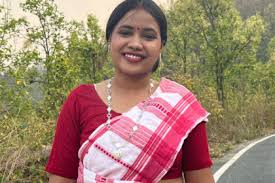In Jharkhand, an Adivasi poet’s fight to document tribal values: ‘Owe this to future generations’

In the hills and forests of Jharkhand, a quiet cultural revolution is unfolding. It is not driven by force or politics but by poetry. One Adivasi poet is using her words to preserve tribal values and pass them down to future generations.
Why Preserving Tribal Culture Matters
Jharkhand is home to many tribal communities like the Santhal, Munda, Ho, and Oraon. These groups carry unique languages, customs, and ways of life. For centuries, they have passed their stories through songs, rituals, and oral traditions. However, today, this heritage is under threat.
Due to rapid urbanization and industrial growth, many young Adivasis are moving away from their roots. They are drawn to cities, education, and modern lifestyles. As a result, traditional knowledge and practices are slowly fading.
This makes it vital to preserve these stories. If not recorded now, they might be lost forever. That’s where the role of poets and storytellers becomes crucial.
The Power of Poetry in Tribal Resistance
For this Adivasi poet, poetry is not just art. It is a weapon of memory and resistance. Her verses capture the joys and struggles of tribal life. She writes about land, forests, women’s lives, and the pain of losing home and identity.
Importantly, her poetry is both deeply personal and powerfully political. It gives voice to those who are rarely heard. Through her work, she urges readers to understand and respect tribal ways of living.
She often says, “We owe this to the future generations. Our stories must not disappear.” Her poems, written in tribal dialects and Hindi, are filled with emotion, truth, and pride.
Facing the Challenges
Despite her talent and message, the poet faces many challenges. Mainstream media and publishers often ignore tribal voices. It is difficult for Adivasi writers to get recognition or platforms to share their work.
Another major issue is language. Many tribal languages have no written script. This makes documentation hard. Additionally, poets who speak out against injustice or government policies face criticism or even threats.
Still, the poet continues her work. She has even turned down awards in protest against silence on tribal issues. Her courage and integrity inspire others to speak up and take pride in their roots.
Going Beyond Poetry
The fight to preserve culture does not stop at poetry. It also includes recording songs, dances, medicines, festivals, and farming traditions. These aspects are deeply linked to the Adivasi way of life.
The poet collaborates with other artists, activists, and researchers. Together, they document these traditions in books, videos, and digital formats. Their goal is to create a record that future generations can learn from.
This also helps fight harmful stereotypes. Adivasis are often misunderstood or ignored in the wider society. By sharing their stories, the poet helps build respect and understanding.
Women Leading the Change
Adivasi women play a powerful role in this movement. Many women poets write about their lives, struggles, and dreams. They highlight the strength of tribal women, both at home and in the community.
Their voices bring fresh perspectives. They also encourage young girls to learn, write, and celebrate who they are. In this way, women writers are shaping the future of tribal literature and identity.
Building a Legacy for Tomorrow
The poet’s mission is not just about the past. It is about the future. She wants young people to know their roots and be proud of them. Culture, she says, is not a thing of the past—it is alive, and it must grow.
She hopes that new generations will continue to write, speak, and share their traditions. Whether through poems, films, or social media, the message remains the same: tribal values matter.
Conclusion
In the heart of Jharkhand, where forests whisper old stories and rivers remember lost songs, an Adivasi poet is writing history. Her fight to document tribal values is not just a personal mission—it is a gift to the future.
Through poetry, she preserves the identity of her people. She proves that stories can heal, inspire, and unite. Most importantly, she reminds us that every culture, no matter how small, deserves a voice.
Let us listen. And let us remember.






